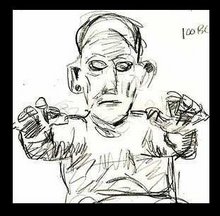The koppo side of Aikido studies destruction, and knowledge of how to destroy an attacker in order to save your life and the lives of others.
My purpose is to guide Aikido students away from the “dancing mindset’, from training in a comfortable way mentally and physically. I want to make them think about the real meaning, the real application of “harmony” – it comes from the moment of being in front of an enemy who can destroy you, who is not going to participate in your harmony. This is the essence of O Sensei’s Aikido meaning, and without this understanding Aikido is missing something important. I often ask my students, “can you defend your life?” Because if your answer is “no”, then your Aikido has no real meaning and you have no real understanding of Aikido principle. If Aikido is just dancing for you, then your Aikido is shallow, and it has no ability to either defend or heal.
Yeah, I get it...if you don‘t want to kill someone you are a woosey, a pansy, a wimp… a LOSER! If you come away from the practice with a sense of harmony and that the uke is not really the enemy and that Aikdio is the art of peace, then you are an idiot.Plus he was the coolest uchideshi of all and the others were pretty lame.
Ultimately that is what it means. Nothing matters unless you can kill somebody. THAT is what koppo really means.
Of course since I never advanced to level of being able to survive a cage match I never really had an understanding of Aikdo, so you can safely ignore me. Of course a boat load of other practitioners are no better off, so why even try? Just give it up and buy a gun, THEN you can defend your self and it take no practice at all.
How can I say this since I am not an Aikido master? Screw that, I am an Aikido school drop out, an Aikido loser. BUT I am also a human, and I realize that for a lot of people martial arts is about being a badass. And I know people and what they want, and they want to WIN and even more so make the other guy LOSE. And what could prove it more than if you can destroy the other guy.
If you check out Aikdo on the Internet there are tons of Aikido guys who have chip on their shoulder when Karate or MMA people say Aikido is crap. Basically they want to prove their “kung fu” is way better than the other guy’s. Some macho Aikido people want to be considered bad ass, And by bad ass I meant destructive, hurtful and able to kill.
And the real take away from the article is unless you want to destroy (kill) the other guy you are not practicing real Aikido. Plus I am sure the the thing about it NOT BEING DANCING is a denigration for another O’ Sensei uchideshi (Just like Saotome) Terry Dobson who wrote a book about Aikido called It’s A Lot Like Dancing
Dobson was a fascinating guy, we was a typical aggressive American who ended up in post war Japan and studied closely with O’ Sensei. His most famous Aikido Story is here
And the point being, the art of harmony starts with seeing that your attacker is not your enemy. And using Aikido to deal with conflict comes NOT from a desire to destroy but from a desire to love.
Consider O’ Sensei’s enlightment story…
O-Sensei’s Enlightenment
(The following is taken from John Steven’s Abundant Peace and Kisshomaru Ueshiba’s Aikido):
In
the spring of 1925, 42-year old Morihei was transformed by a divine
vision. One day, a naval officer visiting Ayabe decided to challenge
Morihei to a kendo match. Morihei consented but remained
unarmed. The officer, a high-ranking swordsman, was naturally
offended at this affront to his ability and lashed out at Morihei
furiously. Morihei easily escaped the officer’s repeated blows
and thrusts. When the exhausted officer finally conceded
defeat, he asked Morihei his secret.
“Just
prior to your attacks, a beam of light flashed before my eyes,
revealing the intended direction.”
Following
the contest, Morihei went out to his garden to draw water from the
well and to wash the sweat from his face and hands. This is
what he later said about what happened:
“I
set my mind on budo when I was about 15 and visited teachers of
swordsmanship and jujutsu in various provinces. I mastered the
secrets of the old traditions, each within a few months. But
there was no one to instruct me in the essence of budo: the only that
that could satisfy my mind. So I knocked on the gates of
various religions but I couldn’t get any concrete answers.
Then
in the spring of 1925, when I was taking a walk in the garden by
myself, I felt that the universe suddenly quaked, and that a golden
spirit sprang up from the ground, veiled my body and changed my body
into a golden one. At the same time my mind and body became
light. I was able to understand the whispering of the birds and
was clearly aware of the mind of God, the Creator of this universe.
At that moment I was enlightened: the source of budo is God’s love
– the spirit of loving protection for all beings.
Endless tears of joy streamed down my cheeks. … I understood, ‘Budo is not felling the opponent by our force; nor is it a tool to lead the world into destructions with arms. True budo is to accept the spirit of the universe, keep the peace of the world, correctly produce, protect and cultivate all beings in Nature. The training of budo is to take God’s love, which correctly produces, protects and cultivates all things in Nature, and assimilate and utilize it in our own mind and body.’”
Endless tears of joy streamed down my cheeks. … I understood, ‘Budo is not felling the opponent by our force; nor is it a tool to lead the world into destructions with arms. True budo is to accept the spirit of the universe, keep the peace of the world, correctly produce, protect and cultivate all beings in Nature. The training of budo is to take God’s love, which correctly produces, protects and cultivates all things in Nature, and assimilate and utilize it in our own mind and body.’”
So is Aikdio like this... “True budo is to accept the spirit of the universe, keep the peace of the world, correctly produce, protect and cultivate all beings in Nature.” or is it to destroy the opponent? Like I said, I am an Aikdo School dropout, and absolutely no authority in the matter, except maybe the authority of reading about O’ Sensei. And it is painful to admit, but when I was practicing I was never very good at it, but I still think about it every day. While I am sure O’ Sensei was a crazy,, complicated, confusing old school master...I see the wisdom of dealing with conflict, not by “destroying” but by seeking redirection and harmony.

